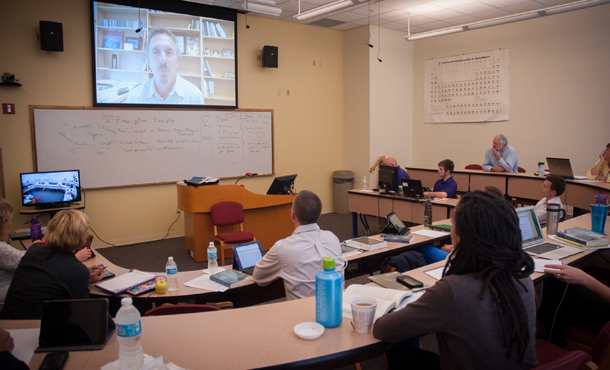Thirteen adult students came to Bluffton (Ohio) University Aug. 11 from as far away as Iowa, Washington D.C. and Ontario, Canada. They went home four days later as one close-knit group.
The one-week residency at Bluffton was only the beginning of a two-year journey for the first students in a new Collaborative Master of Business Administration (MBA) program teaming Bluffton with Eastern Mennonite University and Goshen (Ind.) College. Most of the program will now be taught via interactive videoconferencing, but the brief time together on campus left an impression on members of the first cohort.
In addition to an orientation—including an introduction to videoconferencing—they completed their first class, on “Leadership and Management for the Common Good.” The “common good” concept is the basis of the Collaborative MBA curriculum, with emphasis on six values—spirituality, community, leading as service, justice, sustainability and global citizenship.
Group members also heard Jim Smucker, PhD, program director and the vice president and dean of graduate studies at Eastern Mennonite, outline the philosophy of “leadership for the common good.” It is, he said, “a belief that developing authenticity in people is the way to help them transform their world—that the common good is established each time a person, organization or community reaches beyond individual self-interest for the sake of the greater whole.”
After the residency, “I think I’ll have more courage to speak about my values,” said Freeman Edwards, a cohort member from North Ridgeville, Ohio. Edwards added that he considered other MBA programs but the new collaboration among the three Mennonite institutions seemed “the most ethical.”
For Marsha King, the Collaborative MBA is “a bridge” between her Mennonite background and corporate America, where she works in medical device sales.
King, from Goshen, Indiana, said the residency provided a community experience as a group with “connected values.”
Liz Klassen said she, too, took a sense of community and cohesiveness from the residency as she prepared to return home to Kitchener, Ontario. She had looked at MBA programs that have “the dollar being the bottom line,” but that approach “did not fit, when I’m in a people business,” explained Klassen, executive director of a seniors’ community within Tri-County Mennonite Homes, New Hamburg, Ontario.
The diversity of the cohort members’ backgrounds, as well as ages (28-69), was beneficial to the group dynamic, added Mark Leinbach and Doug Zehr. Leinbach is executive director of SpringHaven Counseling Center, Dundee, Ohio, while Zehr is a Foosland, Illinois, farmer who will soon start a job with Orrville, Ohio-based Venture Products Inc.
Spending a lot of time together outside class was also part of the benefit, said Ruth-Ann Shantz, from London, Ontario. Group members ate every meal together and found “they could bounce significant day-to-day issues off each other,” noted George Lehman, PhD. Lehman is the Howard Raid professor of business at Bluffton and served as instructor of the “Leadership and Management for the Common Good” class.
“We packed a lot of content into five days,” said Lehman about the class, which included a one-day visit from Bill Grace. Grace wrote the 2011 book, “Sharing the Rock: Shaping Our Future through Leadership for the Common Good,” which summarizes 25 years of study on how businesses and other organizations develop leaders.
The content, including a self-assessment by each individual of “who you are as a leader,” proved challenging, according to Chris Paterson, who works for the Community Initiatives network in Iowa City, Iowa.
Cohort members studied leadership styles and discussed both where they’re going as leaders and where they would ideally like to go, Zehr explained. “This will be a journey in getting there,” he acknowledged, but, said King, “I’m glad we have this framework to operate from.”
It was good to hear that there’s a “higher purpose” as a leader in an organization, added Dominique Burgunder-Johnson, director of online campaigns for the National Wildlife Federation in Washington, D.C.
Paterson said he has worked for 10 years with community leaders who have tried to approach issues differently but haven’t been quite sure how to do it. The Collaborative MBA shows “there are ways you can be leaders for ‘the common good,’” he said, predicting “a large potential audience for this.”
Paterson and his peers—alumni of the three collaborating institutions as well as others—will jointly take nine of the 12 courses in the program, which has been in the planning stages since fall 2010. Faculty from Bluffton, Eastern Mennonite and Goshen will each teach three of the nine courses via videoconference. Students will take the remaining three courses, in their respective concentrations, from the institution where they are offered. Program concentrations are leadership; health care management; accounting and financial management; leading nonprofits; conflict transformation; sustainability; intercultural leadership; and a self-designed concentration.
The shared experience of the residency reinforced the value of “walking together and not alone,” said cohort member Bethany Nussbaum, advancement director at Central Christian School in Kidron, Ohio. “This is just a reminder that it’s so important.”
